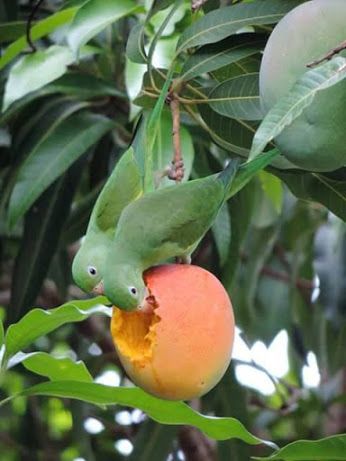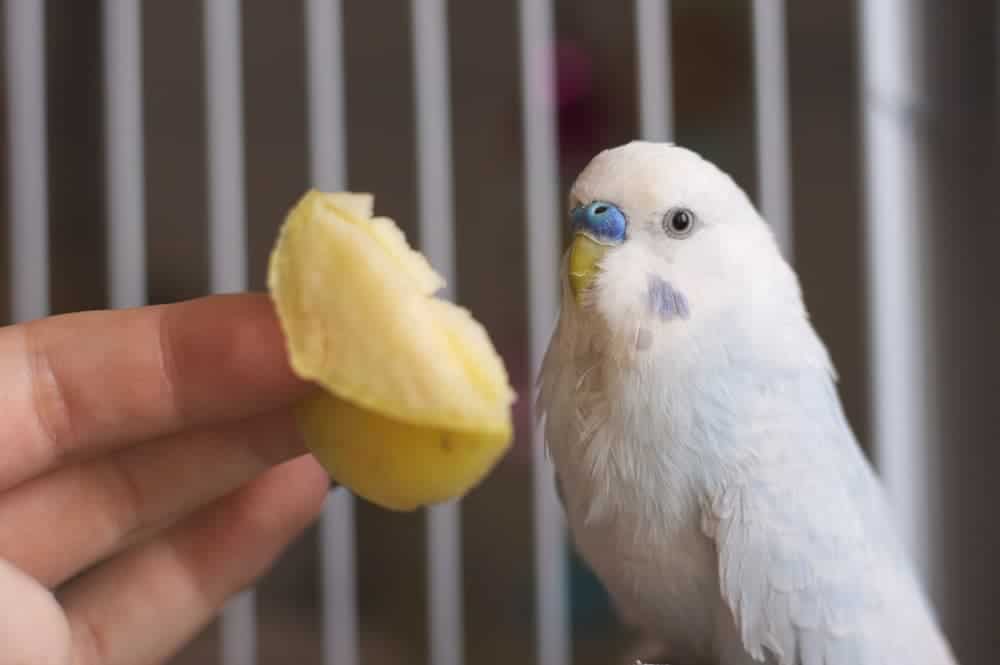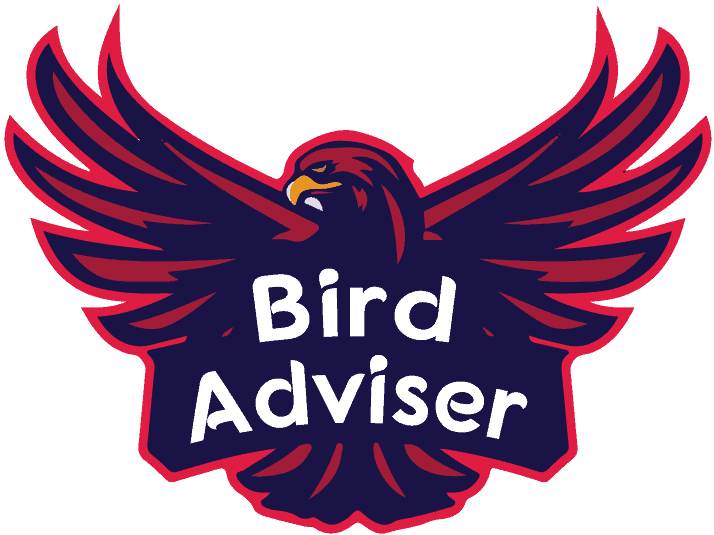Yes, parakeets can eat mango as an occasional treat in their diet.
Mango, a tropical fruit rich in vitamins, minerals, and dietary fiber, can offer some nutritional benefits to these birds.
When introducing mango to a parakeet’s diet, it’s crucial to exercise caution and moderation.
Begin by peeling and removing the pit from the mango, then cut the flesh into small, manageable pieces.
While mango provides natural sugars and nutrients, it should not replace the core components of a parakeet’s diet, such as seeds, pellets, and fresh vegetables.
Treats like mango should be given in limited quantities to avoid excessive sugar intake and potential health issues.
As with any new food, it’s advisable to start with a small amount and closely monitor your parakeet’s response.
If it agrees with their digestive system and they show no adverse reactions, you can occasionally offer mango slices as a flavorful and nutritious treat.
Remember that consulting with an avian veterinarian before introducing new foods can provide specific guidance based on your parakeet’s individual needs.

Is Mango Healthy For Parakeet?
Mangoes are healthy for parakeets, and they also taste very good because of their nutritious juice.
It is low in calories, but your bird can get lots of nutrients that will be beneficial for his health.
Mango Nutritional Values
| Calories: | 99 |
| Protein: | 1.4 grams |
| Carbs: | 24.7 grams |
| Fat: | 0.6 grams |
| Dietary fiber: | 2.6 grams |
| Vitamin C: | 67% of the Reference Daily Intake (RDI) |
| Copper: | 20% of the RDI |
| Folate: | 18% of the RDI |
| Vitamin B6: | 11.6% of the RDI |
| Vitamin A: | 10% of the RDI |
| Vitamin E: | 9.7% of the RDI |
| Vitamin B5: | 6.5% of the RDI |
| Vitamin K: | 6% of the RDI |
| Niacin: | 7% of the RDI |
| Potassium: | 6% of the RDI |
| Riboflavin: | 5% of the RDI |
| Manganese: | 4.5% of the RDI |
| Thiamine: | 4% of the RDI |
| Magnesium: | 4% of the RDI |
Source: Healthline.com
Benefits of Mango for Parakeets
Some of the nutrients of mangoes like vitamin C, vitamin A, potassium, and niacin are very healthy and good for a parakeet.
1. Vitamin C
Mango has 36 grams of vitamin C in each of its 100 grams quantities.
Vitamin C is essential as it helps your parakeet to maintain its immune system and to improve its cardiovascular health.
2. Potassium
Mangoes contain potassium that helps a parakeet grow strong and big, and it is also responsible for the proper growth of your bird.
3. Antioxidants
Mangoes contain polyphenols which are natural plant substances that help to manage the body’s free radicals, protecting it from getting ill.
4. Vitamin A
Mangoes also contain beta-carotene, which has significant benefits on your parakeet’s health as your bird’s body is maintaining epithelial tissues and mucous membranes.
5. Niacin
Niacin helps in increasing muscle strength, reducing any joint fatigue, and keeping the arteries of your parakeet healthy.
How Often Can Parakeets Eat Mango?
A parakeet should not eat a lot of mangoes by any means.
It is suggested that a parakeet should be fed with other snacks or food items around two times each week.
Don’t make the mango a daily diet for your bird; make it a sweet treat for the afternoon, sometimes in a week.
Your pet bird can’t deal with a high dose of sugar, so give it mango with some restraint quantity.
Your parakeet will, without a doubt, seek you for a bigger proportion of mangoes each day, yet this is the point where you should be cautious.
In case you have started feeding your parakeet with excessive mango quantity, it’s time that you put a stop to it and feed it only sometime in a week before it gets sick.
How Many Mangoes Should I Feed My Parakeet?
Mango is strong in normal sugars like most fresh fruits.
This represents a danger of your parakeet creating diabetes in case it consumes too many mangoes.
Parakeets can create diabetes for themselves after some time in case they eat too many mangoes.
Mango is high in sugar, so it ought to be taken with some restraint.
In spite of the fact that mangoes are helpful for your parakeets, portion control is the way to keep a healthy and happy parakeet.
It is suggested that fruits should just make up a modest amount of your parakeet’s day-by-day diet.
Consider giving it only two slices of a mango in a single week.
How to Feed Mango to Parakeets?
You can feed mango to your parakeet in the following way.
- Preparing a mango for your parakeet is quite simple and clear. The initial step includes cutting the mango open and removing the pit.
- The mango’s pit isn’t harmful; however, they are enormous, so it’s in every case best to eliminate them before you serve the mango to your parakeet.
- You should then cut the mango tissue into little scaled-down pieces and serve them to your parakeet.
- You can likewise cut the mango down the middle to eliminate or cut around the seed and feed your parakeet the entire cut on a plate.
- Your parakeets may invest an excess of energy strolling in the mango as they eat it. And then make sure to remove the remains of the mango from its cage so that it doesn’t stay there long and catch bacteria.

Alternative to Mango for Parakeet
In case you want to feed any other food to the parakeet, then you can try the alternatives.
Conclusion
In conclusion, the question of whether parakeets can eat mango can be answered with a cautious yes.
Mango, a tropical delight bursting with vitamins, minerals, and dietary fiber, can indeed be included in a parakeet’s diet, albeit as a limited treat.
While mango provides nutritional benefits, it’s important to remember that moderation is key.
The introduction of mango should not replace the foundational elements of a parakeet’s diet, which should primarily consist of seeds, pellets, and fresh vegetables.
Instead, mango can be offered occasionally, provided it is prepared in small, manageable pieces and free from pits or seeds.
As responsible pet owners, our duty lies in offering a balanced and diverse menu that meets our parakeets’ nutritional needs while safeguarding their health.
By carefully observing their reactions and consulting avian professionals when needed, we can share the joy of this tropical indulgence with our feathered companions while prioritizing their overall well-being.
FAQ
What nutrients does mango offer to parakeets?
Mango is rich in nutrients like vitamin A, vitamin C, vitamin E, and dietary fiber. These nutrients contribute to overall health and well-being.
How should I prepare mango for my parakeet?
Peel the mango and remove the pit, as well as any seeds, as they can be choking hazards. Cut the flesh into small, bite-sized pieces suitable for your parakeet’s consumption.
How many mangoes can I give my parakeet?
Mango should be given in moderation. It’s best to offer small pieces as an occasional treat, and it should not replace the core components of your parakeet’s diet.
Can mango be the primary food for my parakeet?
No, mango should not be the primary food. Parakeets require a balanced diet that includes seeds, pellets, fresh vegetables, and fruits. Mango should be considered a supplementary treat.
Can parakeets eat both ripe and unripe mangoes?
It’s advisable to offer ripe mango, as unripe mangoes can be too acidic and potentially harder for parakeets to digest.
Last Updated on August 21, 2023 by Lily Aldrin

